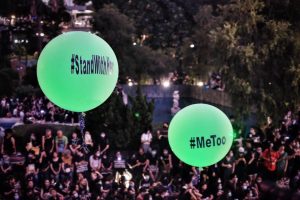14.2.4.2 #MeToo movement
Valentin Quintus Nicolescu and Gregory Millard

The hashtag #MeToo was originally created by activist Tarana Burke (a rape survivor) in 2006 while working at Just Be Inc. as part of her “empowerment through empathy” message to women of colour surviving sexual abuse, assault or harassment: “You’re not alone. This happened to me too”. She viewed the “me too” expression “as a way for survivors to connect with each other and to make a declaration to the world” (Burke, 2021, p. 10). The hashtag went viral in October 2017 when Alyssa Milano used it on Twitter to respond to a New York Times article discussing allegations of sexual assault by Harvey Weinstein, one of the most powerful figures in Hollywood. In the next 24 hours alone, the hashtag was used over 12 million times (Mendes et al., 2018, p. 236). #MeToo became an expression of solidarity that was quickly integrated into the collective feminist consciousness enabling individual participants to understand “sexual violence as a structural rather than a personal problem” (Mendes et al., 2018, p. 238). Today, #MeToo is a global social and political movement, with various hashtags around the world reflecting the same purpose of helping survivors to share, heal and take action against sexual harassment, abuse and assault.
Media Attributions
- 香港METOO遊行 © Pakkin Leung is licensed under a CC BY (Attribution) license

